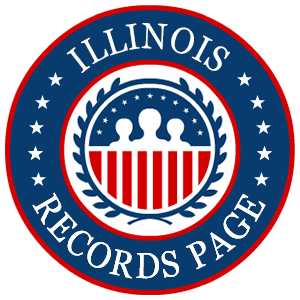Retrieve free Illinois divorce records quickly using the search tools linked throughout this resource.
Divorce records are part of public documents made accessible to citizens due to the Illinois Freedom of Information Act and the broader federal Freedom of Information Act (FOIA). Individuals can obtain divorce records to determine if someone is still married, for legal matters, or just out of curiosity.
Interested parties can seek dissolution documents from several official channels, including state, county and local agencies. This article provides helpful resources that enable searchers to track down details of divorces in Illinois without added stress, hassle, or tedious research.
The Availability of Divorce Records in Illinois
Divorce records are part of data generated by the courts—these documents are public due to the Illinois Freedom of Information Act and the Federal Freedom of Information Act (FOIA).1, 2 Therefore, official state and county agencies are mandated to provide these records upon the request of interested persons.
The scenario in many states is that the general public can view divorce records mostly from the courts for free and without restrictions. However, Illinois is a general exception to the rule and is among a handful of states that allow anyone to not only view but request divorce records.
This means that, unlike many other states, individuals such as parties to the dissolution (couple), immediate family members, and authorized legal representatives do not have exclusive rights to request public divorce records from official channels.
There is a distinction between divorce records and dissolution decrees. Divorce records are typically issued by state agencies and serve as evidence of the vital event; they must also be more detailed.
Conversely, circuit court judges issue and authorize decrees after separating couples successfully file for annulment. These detailed documents are the official documents verifying successful dissolution.
In some instances, citizens could hire third-party vendors to find divorce records on their behalf. This is especially true when interested parties do not want to interact with official channels or are still determining the county that recorded the vital event. Documents acquired from these companies can only serve official purposes if they have received authorization from state agencies.
Regardless of the availability of divorce records in Illinois, the Centers for Disease Control (CDC) conducts a census on statistics on dissolutions, including the average number in each state. As per the last count in 2021, Idaho has a divorce rate of 1.3 per 1000 persons, among the lowest in the country. The rate has remained stable between 2019 and 2021.
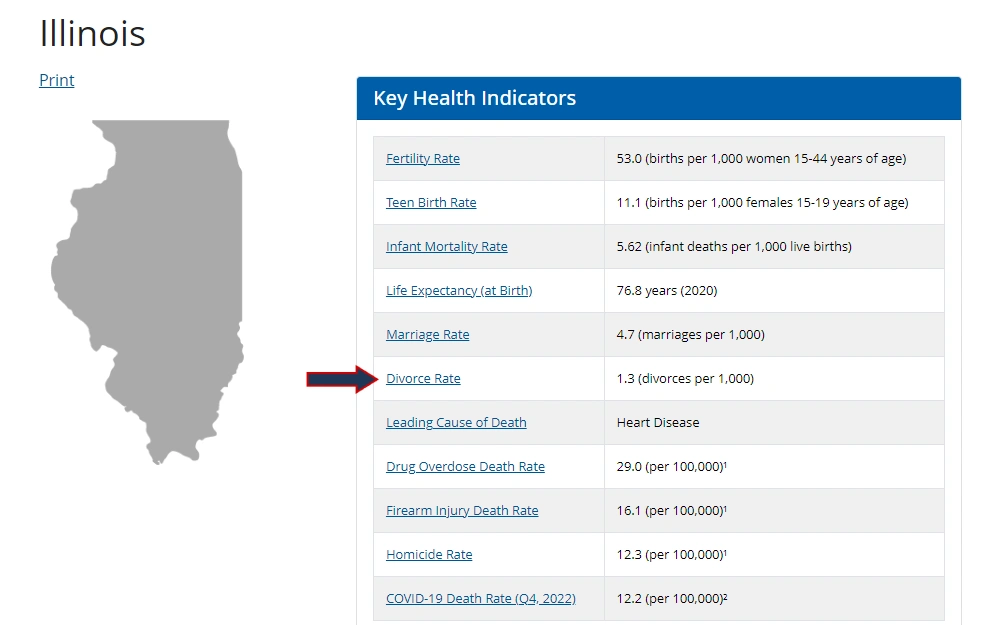
These numbers do not, however, distinguish between same-sex and traditional marriages.
How To Search for Illinois Divorce Records Throughout the Whole State
Citizens may need to search for and acquire divorce records in Illinois for financial matters, name changes or immigration purposes; they may do so through the Department of Public Health – Division of Vital Records. However, this state agency does not issue certified copies of dissolution of marriage records but supplies verification letters that prove the vital event occurred.
These letters are not official and are uncertified. To request certified copies, interested parties will need to contact the Circuit Court Clerk where the dissolution of marriage was issued.4
The Illinois Department of Public Health (IDPH) has a divorce index of dissolution records for the state from 1962 to the present. Patrons may request copies of divorce verification letters through mail, fax, and in person.
To initiate a mail request, download and print the Application for a Verification of Divorce Form and provide the necessary details, such as the party of the record’s information and their dates of birth.5 The cost to procure these letters is $5.00, and additional copies cost $5.00 a page; all other charges can be seen in this fee schedule. Applicants can make payment by money order or check via the ‘Illinois Department of Public Health.’
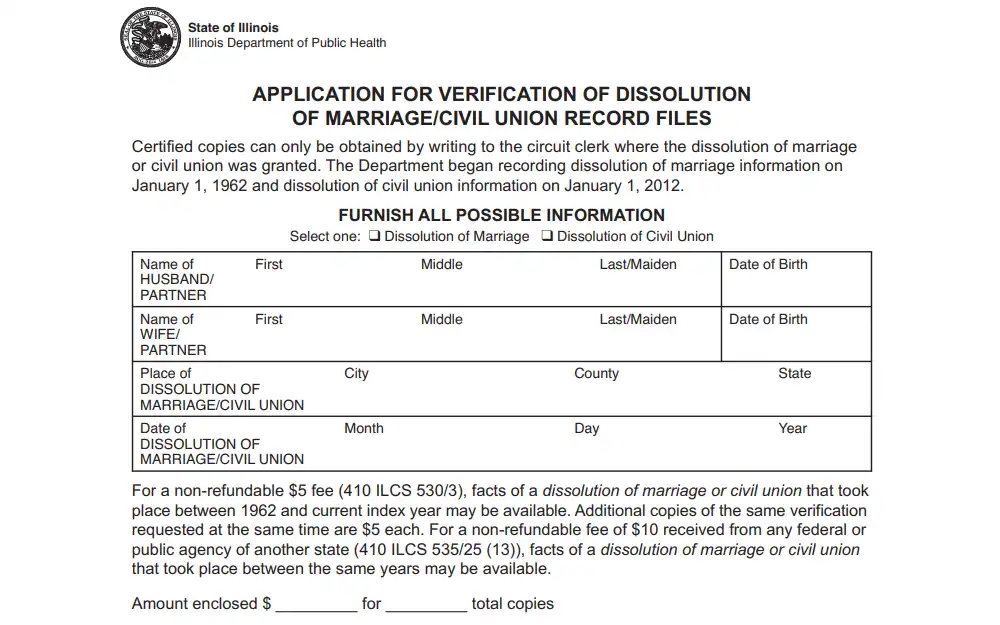
Patrons must also include a valid government-issued ID. Mail the application packet to the address below. Requestors should expect their documents in 4-6 weeks, excluding delivery time.
Illinois Department of Public Health
Division of Vital Records
925 East Ridgely Avenue
Springfield, Illinois 62702-2737
In addition, applicants can send their requests by fax to 217.523.2648. They must include the application form above and credit card information. The search costs are the same, but an additional $12.95 credit card fee and $19.50 for shipping (UPS) applies. Applicants must also include a daytime phone number, return address, a copy of a valid ID, and their signature.
Lastly, patrons may drop off their orders for mail out within 3 business days at the Vital Records Office location below. Requesters may do so Monday to Friday, 10 AM to 3 PM, and must show a valid ID when requesting the divorce verification documents.
Illinois Department of Public Health
Division of Vital Records Office
925 East Ridgely Avenue
Springfield, Illinois 62702
For further questions, call the IDPH – Vital Records Division at 217.782.6554.
Citizens needing to acquire archived divorce records for genealogy purposes may contact other state agencies such as the Illinois State Archives; these will be detailed below.
Finding Records of Divorce via Counties & Cities in IL
Searching for divorce records in Illinois at the state level provides the widest search scope since it encompasses all the counties.
Divorce proceedings occur at the county level, so this type of query is helpful if the county of record is yet to be determined. Finding dissolution documents from local jurisdictions, such as counties and sometimes cities, presents several benefits to requestors.
In Illinois, citizens can obtain copies of certified and non-certified divorce records only from the Circuit Court Clerk, not the state’s Vital Records Office.4 Furthermore, county public agencies often provide online search tools to find and view dissolution records conveniently and for free.
These offices tend to serve smaller populations and, therefore, have faster processing time of requests. Courthouses will often have terminals in which patrons can view records at no cost.
Illniois’ three most populated counties are Cook, DuPage and Lake counties. These jurisdictions will serve as examples of acquiring divorce records at the county level.
Acquire Divorce Records in Cook County: Citizens in Cook County who need to retrieve dissolution records can contact the Domestic Relations Division of the Clerk of the Circuit Court. Patrons have several options to request divorce records, including online, phone and in-person requests.6
The fastest way to view dissolution records in Cook County is online using their On-Line Case Information Tool, which the public can use to scour court records for free. This tool has several functions, including one to query Cook County Domestic Relations Cases, where divorce records reside.7 Users can look up records by case number or name.
Each record set will show varying case information, including party names (divorcing couples), case numbers, filing dates, and court activity.
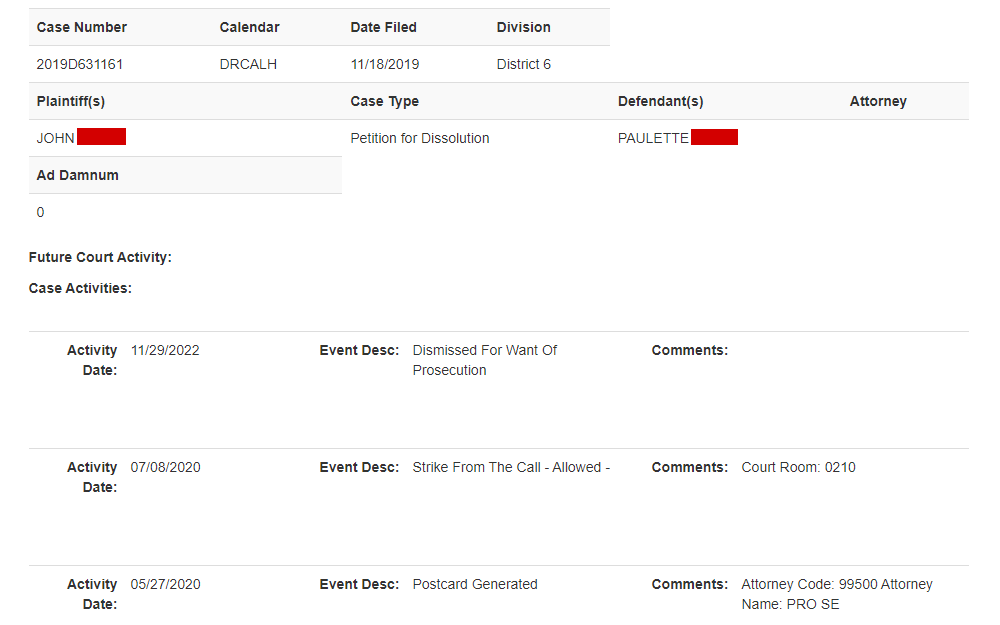
Individuals who need to obtain certified copies of dissolution decrees can visit Room 802 of the Daley Center or the suburban courthouse where the case was heard; the address can be found below. Applicants will be advised on the costs to acquire copies at the courthouse.
Office of the Cook County Clerk of the Circuit Court
Richard J. Daley Center, Room 802
50 W. Washington, Suite 1001
Chicago, IL 60602-1305
For inquiries, contact the Domestic Relations Division by calling 312.603.6300 or emailing [email protected].
Retrieve Dissolution Documents in DuPage County: Patrons can search for divorce records from court documents in custody of the Domestic Relations Division of the 18th Judicial Circuit Court Clerk. A convenient way to access DuPage County divorce records is by utilizing the Case Search Tool, which is free for public use. Users can search the tool by using the case number or name to find documents.
Information on the record will include case numbers and names, filing dates, and case events.
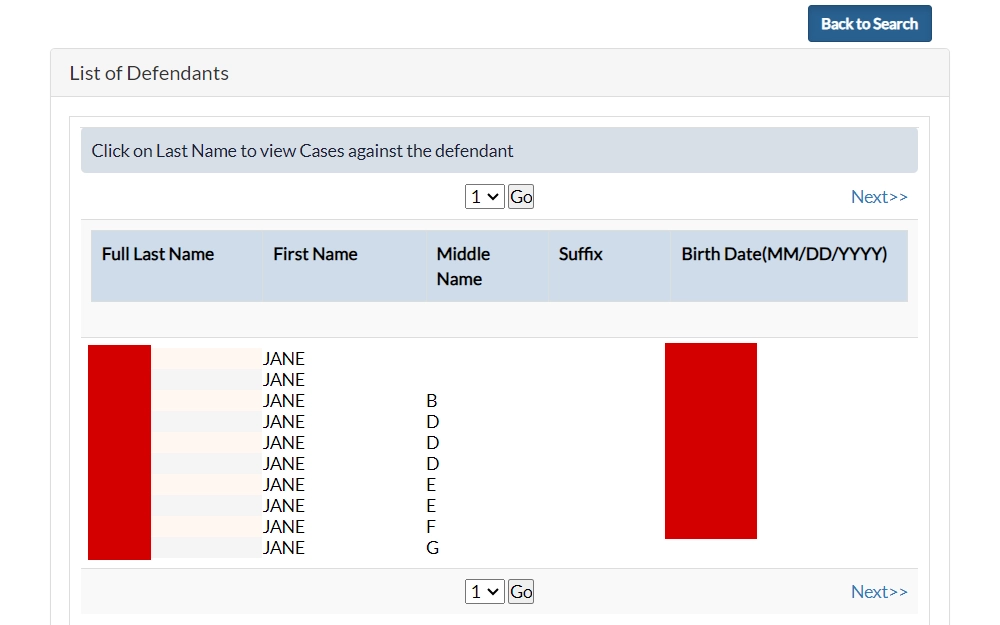
Moreover, interested individuals can order certified copies of divorce records electronically using i2File. This platform requires users to register for a free account before utilization.
Click on the ‘Request Documents’’ and select ‘DuPage’ since this portal serves requests from other counties. Click on ‘Request Document Copy’; users may order certified or uncertified copies.
Requesting documents costs $2.00 for the first page, $0.50 for pages 2-20 and $0.25 for any page after that. Certification costs are $6.00 per document.
Finally, interested parties can view dissolution records in person at the Clerk of the Circuit Court location in Wheaton through information terminals for free, Monday to Friday, 8 AM to 4:30 PM.
Office of the DuPage County Circuit Court Clerk
505 North County Farm Road
Wheaton, Illinois 60187
For questions, contact the Clerk of the Circuit Court electronically or call 630.407.8700.
Search for Dissolution Certificates in Lake County: Residents in Lake County can view and request copies of certified and non-certified divorce records from the County Circuit Clerk. The clerk maintains copies of civil records, including divorce documents.
These can be accessed conveniently using the Lake County Circuit Clerk’s Online Portal for free. Users must register for free to use the portal, and they may additionally view and pay for document copies.
Once logged in, requestors may run a free public divorce records search using their name, case number, and business name. Records from the case will show data such as the case number, party name, documents filed, and events.
Citizens may also order copies of dissolution records electronically.9 Charges for acquiring copies of records can be acquired from this fee schedule. The office attempts to process the request by the next business day; additionally, the clerk allows patrons to request certified and non-certified copies.
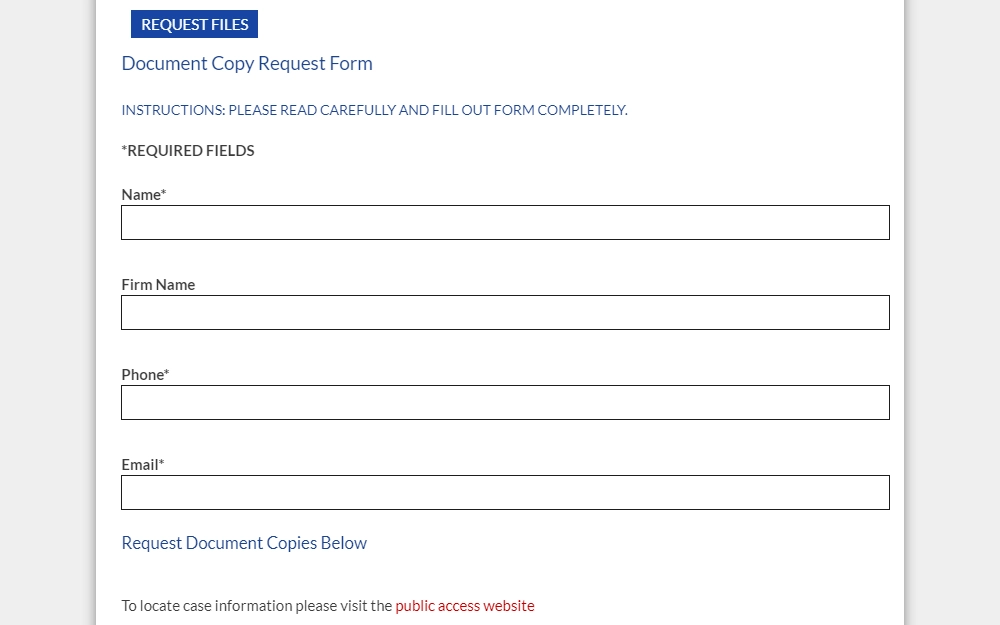
Lastly, interested parties may also visit the Lake County Clerk Circuits’ Office at the address below. For more information, contact the clerk by calling 847.377.3236.
Lake County Clerk Circuits’ Office
18 North County Street
Waukegan, IL 60085
Acquire Dissolution Records via Cities & Towns: Some local jurisdictions may allow citizens to search for and view divorce records. Illinois’s three most populated cities are Chicago, Aurora, and Naperville. These three population centers will serve as a showcase for finding divorce records at the local level.
Chicago does not issue vital records, including divorce documents; the city refers requesters to Cook County agencies to seek these certificates. The City of Aurora only maintains records pertaining to its jurisdiction and does not issue divorce certificates. Aurora is located in two counties, DuPage and Kane County—patrons may reach out to either agency that issued the annulment.
Like the other two cities, the City of Naperville permits records requests but only for those pertaining to the city; it does not issue vital documents. The city is in DuPage County, and residents must contact the Circuit Court to view and obtain divorce documents.
As a note, citizens may sometimes need to acquire older divorce records for genealogy and ancestry research—they can seek these from state agencies like the Archives. This is expanded upon below.
Finding Archived Divorce Information in Illinois for Genealogy Purposes (Free Lookups)
Often, people must locate older divorce records in Illinois for genealogy purposes and to research ancestry lineage. Several county and state agencies, including the Illinois State Archives, Circuit Courts, and newspapers, are where citizens can turn to find older dissolutions records.
The Illinois State Archives permits citizens to perform genealogical research requests through online, mail, fax, email, phone, or through in-person requests. Requesters can make online requests by filling and submitting an Archives Reference Request Form; costs for making these orders are in this fee schedule.10 In-person, fax, and mail requests are performed with the information below.
Illinois State Archives
Reference Unit Margaret – Cross Norton Building
100 East Jackson St
Springfield, IL 62756
Phone: 217.782.3556
Fax: 217.524.3930
Email requests are performed through a contact form.
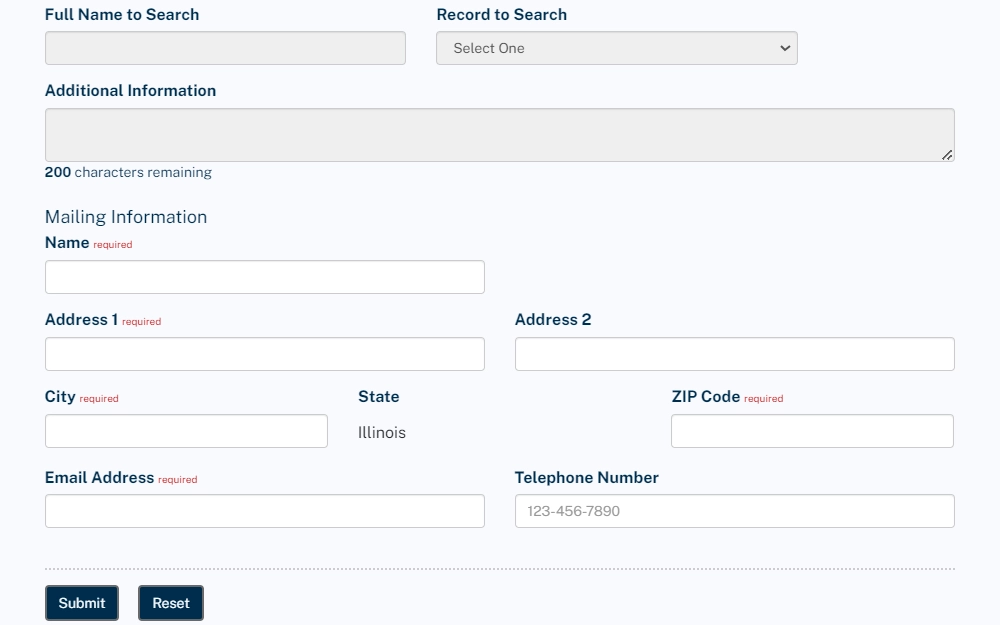
Alternatively, Illinois Circuit Courts provide a viable source for archived divorce records. Illinois county courts have records of divorces dating back to 1804 to the present. Also, the Illinois Public Health Department (IPHD) holds a dissolution index of records dating back to 1961 to present.11 Additionally, the IPHD provides genealogy resources to aid patrons in their search for older divorce records.
Citizens can also access digitized newspapers that have notices of divorces. These resources are free to use and are furnished by several agencies, including the Library of Congress, Illinois Library Digital Newspaper Collection, and the state’s Digital Newspaper Collections. All these tools are free for public use; moreover, they have search features to help users find records with appropriate and relevant keywords.
How To Look Up Dissolutions of Marriage & Divorces in Illinois (Statewide Search)
Dissolution of marriage records are located primarily at the county level in Illinois but also the state level. Citizens can find a semblance of divorce records through verification letters by contacting the Department of Public Health – Division of Vital Records.
This state agency has dissolution of marriage records that go back to 1961 to the present. These verification letters are not certified documents and only prove that the vital event occurred.
Citizens may request dissolution documents through mail, fax, and in person at the Vital Records Office.11 The process to perform these requests was discussed in earlier sections.
In addition to these records, the IDPH has maintained documents of civil union dissolutions since 2012. A civil union is a legally recognized arrangement similar to a marriage conceived for same-sex couples. Like regular marriages, interested individuals may only request verification letters from the IDPH that prove the dissolution of the union takes place.
Actually copies of divorce decrees (certified and non-certified) for marriage and civil unions can only be sought from Illinois Circuit Courts where the separation was granted.4 Often, these circuit courts will also allow citizens to view dissolution decrees online using portals, but requestors may also visit the courthouses to view and print copies of divorce records.
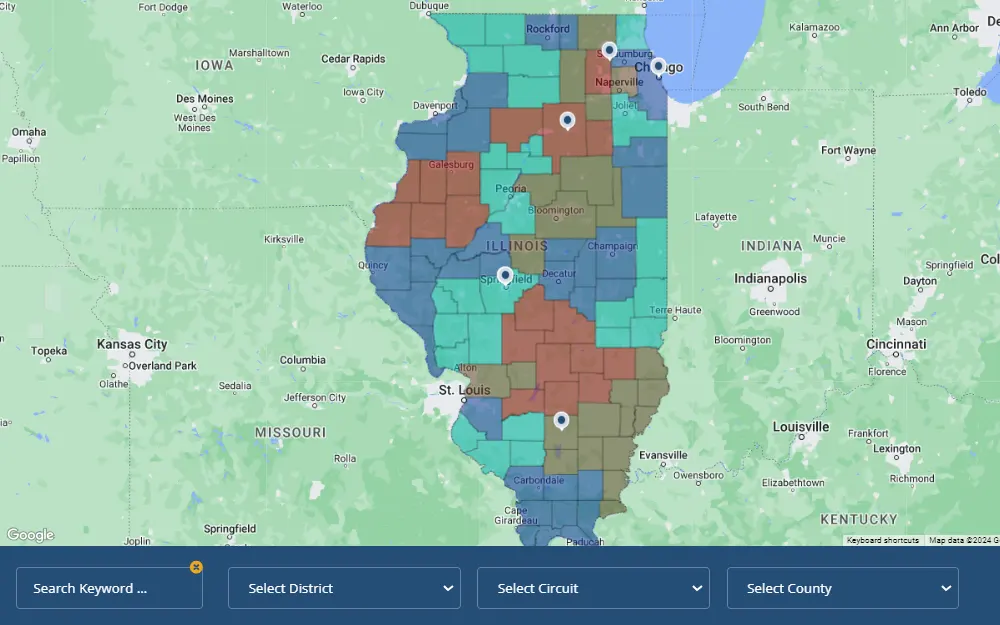
Common law marriages are not recognized in Illinois, but the state acknowledges couples unions from states that deem them lawful.12 Therefore, it is possible to find common law divorce records in county and state agencies. Confirm with the circuit court if they have records of these divorces.
How To Get a Divorce in Illinois: Filing & Addressing Petitions
Illinois has several laws, procedures, and requirements for couples who need to file and petition for divorce, including residency prerequisites and grounds for separation set forth by the Marriage & Dissolution of Marriage Act.13
Before filing for a dissolution of marriage, one of the spouses must have resided or been stationed (serving in the military) in Illinois for at least 90 days pursuant to 750 Ill. Comp. Stat § 5/401.
In addition, Illinois is not an at-fault divorce state which means that the couple does not need to prove that one of the spouses’ actions caused the separation. Reasons include adultery, desertion and cruelty. These types of divorces are quicker because there is no need to prove the cause of the separation in court or obtain a spouse’s consent to end the marriage.
Moreover, as per 750 Ill. Comp. Stat. § 5/401, Illinois courts will find a good reason to grant a divorce where there is no chance of reconciliation and the spouses have lived separately for 6 months or more before a judgment is entered.
There are two forms of divorce in Illinois: uncontested and contested. Uncontested divorces are quicker and simpler. They are a type of separation where the couple does not disagree on matters such as child custody (including child support), sharing of assets, or spousal support (if applicable). As there is no fighting in courts, judges only have to review and authorize a settlement agreement before issuing the divorce.
Additionally, divorces occur in two circumstances: those with children and those without. Spouses petition for a divorce in the Illinois Circuit Court where either resides.4
It is advisable to obtain the services of a legal representative when going through divorce proceedings, especially those that are contested—this helps both parties get the best terms of the separation since lawyers have a better understanding of navigating Illinois laws.
Uncontested Divorce: Upon agreeing to file for divorce, spouses will need to file several forms with the Clerk of Circuit Court. Petitioners for divorce can view these instructions on how to get a dissolution with children and one without children.
Spouses will need to contact the clerk for the specific forms; however, these forms are required in most courts.
- Petition for Dissolution of Marriage or Civil Union with children and without children
- Judgment of Dissolution of Marriage or Civil Union accompanied with children and in the absence of children
- A Parenting Plan is needed if there are children involved
- Entry of Appearance Form which applies if the there is no need to serve the defendant (spouse) with a summons
- Summons (if applicable)
These forms represent the basic paperwork needed to file a divorce, however, depending on the situation of the couple, additional forms may be needed. Filing fees will vary depending on the county—contacting the circuit court to ascertain this information is best. However, to get an idea, the Lake County Circuit Court Clerk charges couples $334 as of 2023 to petition for a divorce.
Nevertheless, couples facing financial difficulty can request a waiver by filing an Application for Waiver of Court Fees.14 If the court grants the request, the couple will not have to pay filing fees.
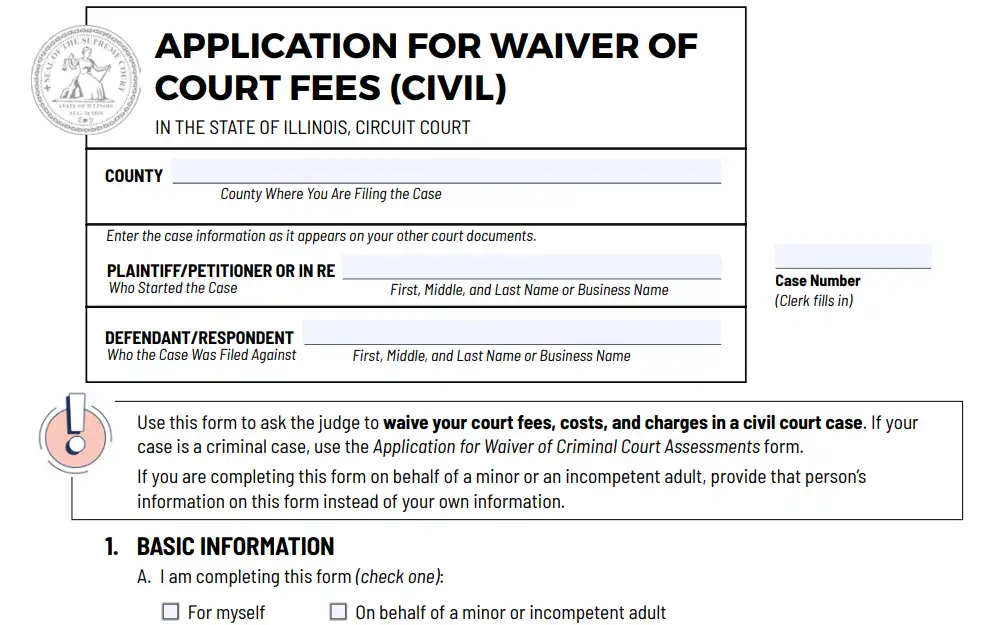
Moreover, couples who agree on the divorce terms can file for a quicker form of divorce known as the joint simplified dissolution. As per 750 Ill. Comp. Stat. § 5/452, some conditions must be met, including but not limited to:
- The marriage lasted less than 8 years.
- Fair market value of property after a divorce appraisal is less than $50,000.
- No children were born in the marriage, and neither spouse is pregnant.
- The marriage is irreconcilably broken.
Illinois does not have a waiting period for when a divorce can be filed and when the courts begin to process them. Uncontested divorces typically take 2-6 months to finalize.
Contested Divorces: Contested divorces require the same forms as outlined before; however, the spouse will need to ensure that the form they are filing is not one specific to an uncontested separation. Couples may sometimes be able to work out their differences; in cases like this, they should consider arbitration (mediation) through a third-party mediator.
This is less expensive than fighting in court, and if they are successful at completing it, the couple may elect to file an uncontested divorce. Furthermore, in Illinois and as per 750 Ill. Comp. Stat. § 5/602.10, judges may order the ex-wife and husband who can’t agree on a parenting plan to mediation.
Upon filing the necessary paperwork, the spouse will need to give the defendant (other spouse) notice of the separation by serving divorce papers (copies of the filed paperwork). In the case of a cooperating defendant, it is easier to agree to waive service by completing and filing an Entry of Appearance form. This allows the spouse to present or mail copies of the paperwork.
If the defendant is not cooperating, the spouse must typically serve the papers through a sheriff delivering them by mail or in person. If this is not feasible, the spouse may file a motion requesting an alternate service method. This can be through publishing a notice in a newspaper or more recently allowed communication such as text, email or direct message in a social media account.
Contested divorces are long and expensive; they can take 6 months to several years.
The public can view Illinois divorce records for personal and professional reasons; this streamlined article provides helpful resources from official channels for finding and retrieving dissolution documents.
Continue your public information search by checking out either the IL marriage search steps or by looking up all free public records in Illinois (includes property, crimes, inmates, deaths, births, and more).
References
1Illinois General Assembly. (n.d.). Illinois Compiled Statutes (ILCS). Retrieved February 14, 2024, from <https://www.ilga.gov/legislation/ilcs/ilcs3.asp?ActID=85>
2U.S. Department of Justice, Office of Information Policy (OIP). (2016). Freedom of Information Act Statute. FOIA.gov. Retrieved February 14, 2024, from <https://www.foia.gov/foia-statute.html>
3Centers for Disease Control and Prevention, National Center for Health Statistics. (2023, September 12). Illinois. Retrieved February 15, 2024, from <https://www.cdc.gov/nchs/pressroom/states/illinois/il.htm>
4Illinois Courts. (n.d.). Find Your Court. Retrieved February 14, 2024, from <https://www.illinoiscourts.gov/courts-directory/interactive-map>
5Illinois Department of Public Health. (2017, September 11). Application for Verification of Dissolution of Marriage. Retrieved February 14, 2024, from <https://dph.illinois.gov/content/dam/soi/en/web/idph/files/forms/verificationdisolutionofmarriagerecordfiles-091117.pdf>
6Clerk of the Circuit Court of Cook County. (2022, April). A Guide to the Domestic Relation Division. Retrieved February 14, 2024, from <https://www.cookcountyclerkofcourt.org/sites/g/files/ywwepo221/files/document/file/2022-04/A%20Guide%20to%20the%20Domestic%20Relation%20Division.pdf>
7Clerk of the Circuit Court of Cook County. (n.d.). Civil, Law, Chancery, Domestic Case Search. Online Case Search. Retrieved February 14, 2024, from <https://casesearch.cookcountyclerkofcourt.org/CivilCaseSearchAPI.aspx>
8DuPage County Clerk of the 18th Judicial Circuit Court. (n.d.). List of Defendants. Online Case Search. Retrieved February 14, 2024, from <https://epay.18thjudicial.org/Clerk/caseNameSearch.do;jsessionid=167DEED950591C64FF80F2514092DFF8>
9Lake County Clerk of the 19th Judicial Circuit Court. (n.d.). Request a File or Document. Retrieved February 14, 2024, from <https://www.lakecountycircuitclerk.org/i-want-to/request-a-file-or-document>
10Illinois State Archives. (n.d.). Submit a Reference Request. Retrieved February 14, 2024, from <https://apps.ilsos.gov/isa/refrequestform.jsp>
11Illinois Department of Public Health. (n.d.). Dissolution of Marriage Records. Retrieved February 14, 2024, from <https://dph.illinois.gov/topics-services/birth-death-other-records/dissolution-marriage-records.html>
12Illinois Department of Human Services. (n.d.). PM 09-02-01-e: Common-law Marriages. Retrieved February 14, 2024, from <https://www.dhs.state.il.us/Page.aspx?item=15757>
13Illinois General Assembly. (2016, January 1). Families – (750 ILCS 5/) Illinois Marriage and Dissolution of Marriage Act. Retrieved February 14, 2024, from <https://www.ilga.gov/legislation/ilcs/ilcs4.asp?DocName=075000050HPt%2E+IV&ActID=2086&ChapterID=59&SeqStart=3800000&SeqEnd=5300000>
14Illinois State Circuit Court. (2024, January). Application for Waiver of Court Fees (Civil). Retrieved February 14, 2024, from <https://ilcourtsaudio.blob.core.windows.net/antilles-resources/resources/52beec8c-25fc-4d0f-bc56-82a93b68d395/FW-CIV%20Application.pdf>
